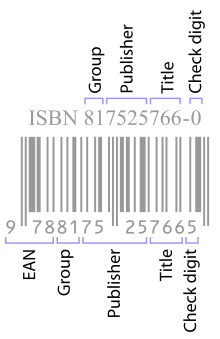
The International Standard Book Number (ISBN) is a numeric commercial book identifier that is intended to be unique. Publishers purchase or receive ISBNs from an affiliate of the International ISBN Agency.

Lebanon, officially the Republic of Lebanon, is a country in West Asia. It is bordered by Syria to the north and east, by Israel to the south, and by the Mediterranean Sea to the west; Cyprus lies a short distance away from the country's coastline. Lebanon's location at the crossroads of the Mediterranean Basin and the Arabian hinterlands has contributed to the country's rich history and shaped a unique cultural identity denoted by religious diversity. Located in the Levant region of the Eastern Mediterranean, the country has a population of more than five million people and covers an area of 10,452 square kilometres (4,036 sq mi). Lebanon's capital and largest city is Beirut, followed by Tripoli and Jounieh. While Arabic is the official language, French is also recognized in a formal capacity; Lebanese Arabic is the country's vernacular, though French and English play a relatively significant role in everyday life, with Modern Standard Arabic being limited to news and government matters.
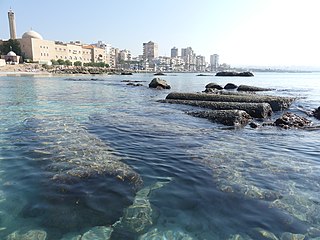
Tyre is a city in Lebanon, one of the oldest continually inhabited cities in the world, though in medieval times for some centuries by just a tiny population. It was one of the earliest Phoenician metropolises and the legendary birthplace of Europa, her brothers Cadmus and Phoenix, as well as Carthage's founder Dido (Elissa). The city has many ancient sites, including the Tyre Hippodrome, and was added as a whole to UNESCO's list of World Heritage Sites in 1984. The historian Ernest Renan noted that "One can call Tyre a city of ruins, built out of ruins".

Beirut is the capital and largest city of Lebanon. As of 2014, Greater Beirut has a population of 2.5 million, which makes it the third-largest city in the Levant region and the thirteenth-largest in the Arab world. The city is situated on a peninsula at the midpoint of Lebanon's Mediterranean coast. Beirut has been inhabited for more than 5,000 years, making it one of the oldest cities in the world.

Ali Ahmad Said Esber, also known by the pen name Adonis or Adunis, is a Syrian poet, essayist and translator. He led a modernist revolution in the second half of the 20th century, "exerting a seismic influence" on Arabic poetry comparable to T.S. Eliot's in the anglophone world.

The culture of Lebanon and the Lebanese people emerged from various civilizations over thousands of years. It was home to the Phoenicians and was subsequently conquered and occupied by the Assyrians, the Greeks, the Romans, the Persians, the Arabs, the Crusaders, the Ottoman Turks and the French. This variety is reflected in Lebanon's diverse population, composed of different religious groups, and features in the country's festivals, literature, artifacts, cuisine and architecture of Lebanon. Tourism in Lebanon is popular with periods of interruption during conflict.

Armenians have lived in Lebanon for centuries. According to Minority Rights Group International, there are 156,000 Armenians in Lebanon, around 4% of the population. Prior to the Lebanese Civil War, the number was higher, but the community lost a portion of its population to emigration.
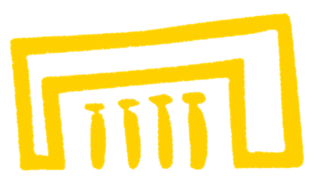
The National Museum of Beirut is the principal museum of archaeology in Lebanon. The collection begun after World War I, and the museum was officially opened in 1942. The museum has collections totaling about 100,000 objects, most of which are antiquities and medieval finds from excavations undertaken by the Directorate General of Antiquities.
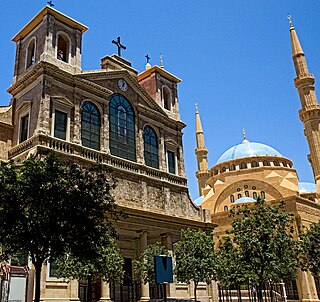
Lebanon is an eastern Mediterranean country that has the most religiously diverse society within the Middle East, comprising 18 recognized religious sects. The religions are Islam and Christianity. The Druze concern around an estimate of 5% of the citizens in Lebanon.

The Arab world consists of 22 states. As of 2021, the combined population of all the Arab states was around 475 million people.
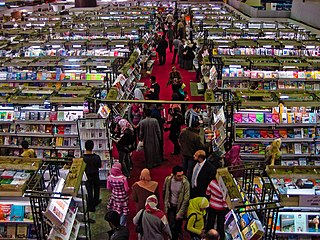
The Cairo International Book Fair is the largest and oldest book fair in the Arab world, held every year in the last week of January in Cairo, Egypt, at Egypt International Exhibitions Center in New Cairo, it is organised by the General Egyptian Book Organisation. The Fair is considered the most important event in the Arabic publishing world.
There is a small Italian community in Lebanon consisting mainly of Lebanese citizens of Italian heritage as well with expatriates and migrants from Italy who reside in Lebanon. It is a community with a history that goes back to Roman times.

Mahmoud Saeed is an Iraqi-born American novelist.

The 2011 Lebanese protests, also known as the Intifada of Dignity or Uprising of Dignity were seen as influenced by the Arab Spring. The main protests focused on calls for political reform especially against confessionalism in Lebanon. The protests initiated in early 2011, and dimmed by the end of the year. In another aspect of the Arab Spring, Lebanese pro and anti-Assad factions descended into sectarian violence, which culminated in May–June 2012.
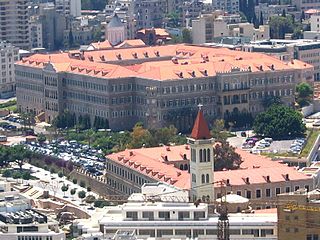
The Phoenician port of Beirut, also known as the Phoenician Harbour of Beirut and archaeological site BEY039 is located between Rue Allenby and Rue Foch in Beirut, Lebanon. Studies have shown that the Bronze Age waterfront lay around 300 metres (330 yd) behind the modern port due to coastal regularisation and siltation. It was excavated and reported on by Josette Elayi and Hala Sayegh in 2000 and determined to date to the Iron Age III and Persian periods. Two nineteenth-century Ottoman docks were also unearthed during construction, just to the north of this area at archaeological sites BEY018 and BEY019.

Dar AlHadaek is a Lebanese company that publishes and distributes children's books and magazines in the Arab world. It was founded in 1987.
Lebanon is not only a regional center of media production but also one of the most liberal and free in the Middle East. Despite its small population and geographic size, Lebanon plays an influential role in the production of information in the Middle East and is "at the core of a regional media network with global implications".
Arsal, is a town and municipality situated east of Labweh, 124 kilometres (77 mi) northeast of Beirut, in Baalbek District of Baalbek-Hermel Governorate, Lebanon. The population is predominantly Sunni Muslim.

Islam in Lebanon has a long and continuous history. According to an estimate by the CIA, it is followed by 63% of the country's total population. Sunnis make up 31.9%, Twelver Shia make up 31.2%, next to smaller percentages of other Shia branches, such as Alawites and Ismailis. The Druze community is designated as one of the five Lebanese Muslim communities, even though most Druze do not identify as Muslims, and they do not accept the five pillars of Islam.

Fatima Sharafeddine is a Lebanese writer, editor, and translator of children's and young adults' books. She holds an M.A. in Educational Theory and Practice (1993) and an M.A. in Modern Arabic literature (1996), both from Ohio State University. More than 120 books of Sharafeddine were published all over the world, and many of them were translated into more than 15 languages including English, Dutch, and Spanish. Sharafeddine has won several awards such as the Etisalat Children's Literature Award in 2017. She was, moreover, nominated for the Astrid Lindgren Memorial Award in 2010, 2011, 2016, and 2020.
